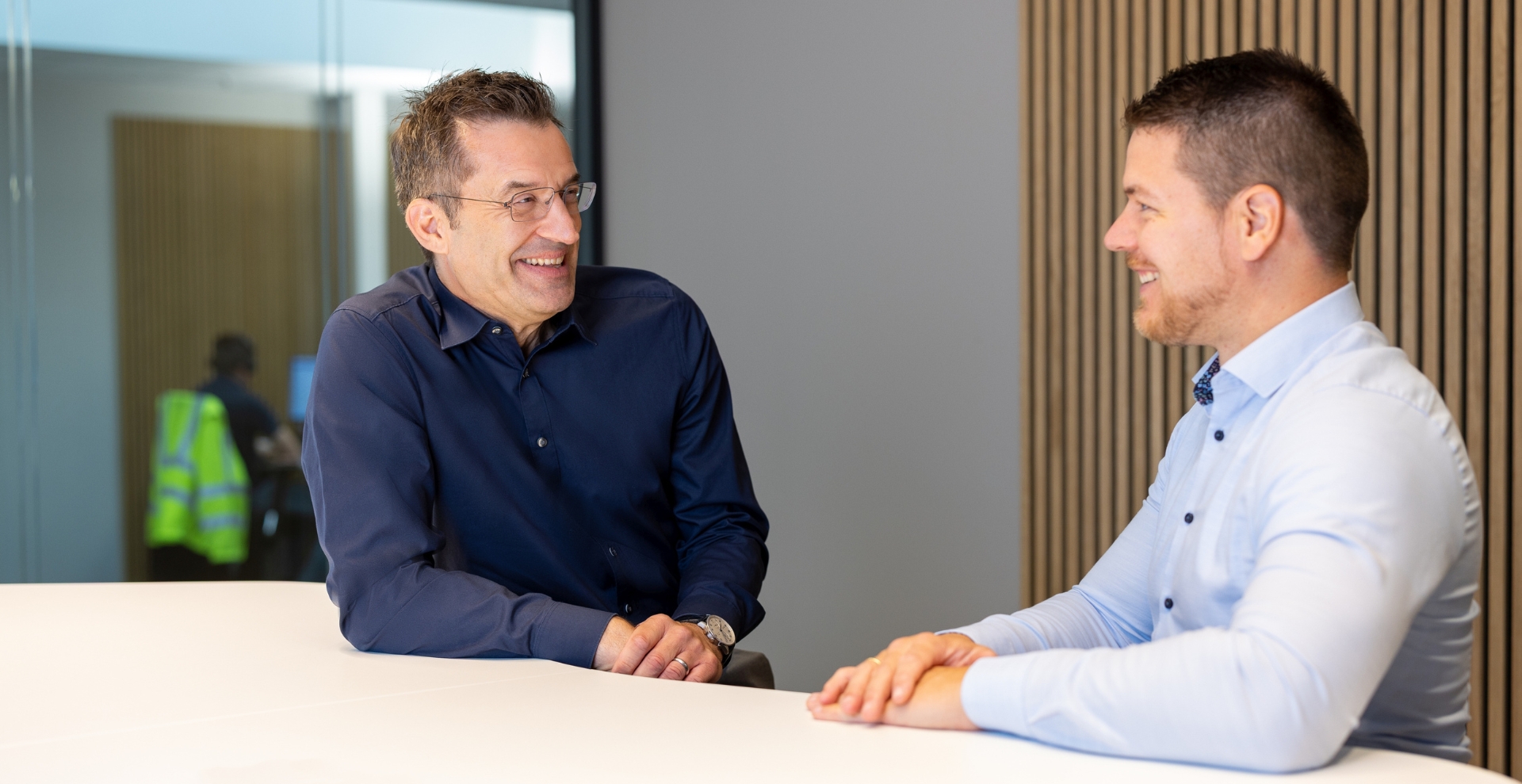“Always looking ahead”

Dr. Günter Schweitzer has been Chief Operating Officer and responsible for sustainability on the Executive Board since September 1, 2021. Thomas Wissing de Freitas has been Sustainability Manager at Schmitz Cargobull since April 1, 2022. In this interview, they talk about the progress and challenges facing the company.
Interview
What are your highlights in terms of sustainability successes?
Schweitzer: We have launched products that make a significant contribution to the sustainable transformation of our industry – our fully electric S.KOe COOL refrigerated box body, for example, which enables refrigerated goods to be transported emission-free. Another milestone is the 70 percent reduction in Scope 1 and 2 emissions since the 2021/22 fiscal year. Our SBTi-validated net-zero targets are also part of this, in my opinion; they are our clear commitment to a climate-neutral economy. And finally, the German Sustainability Award 2025 in the field of mobility and logistics. This is a recognition that fills me and our entire team with pride. You need to embed sustainability issues in the company. What are the biggest challenges? Wissing de Freitas: With such a wide range of issues, it is important to set clear priorities and focus on the essential aspects. Against the backdrop of the political climate, regulatory requirements, and the ecological-economic conflicts of interest that arise, sustainability seems to be losing importance. The current challenge is to show the way from skepticism to confidence. We can do this by providing context, putting developments into perspective, and showing people visible successes. For us, sustainable solutions usually have economic and ecological advantages.
You need to embed sustainability issues in the company. What are the biggest challenges?
Wissing de Freitas: With such a wide range of issues, it is important to set clear priorities and focus on the essential aspects. Against the backdrop of the political climate, regulatory requirements, and the ecological-economic conflicts of interest that arise, sustainability seems to be losing importance. The current challenge is to show the way from skepticism to confidence. We can do this by providing context, putting developments into perspective, and showing people visible successes. For us, sustainable solutions usually have economic and ecological advantages.
What are your goals with this third sustainability report?
Wissing de Freitas: Reporting is a good opportunity to take stock of the status quo. Whereas we previously reported according to the GRI standard, we are now voluntarily trialing the new EU standard for sustainability reporting. This is also reflected in the structure of the report. In the interests of various stakeholders, we have found a middle ground between attractive content and the requirements of the standard. It is an advantage that the reporting requirements are being adapted. This will have a very concrete impact on future reports.
What is your view on regulatory developments?
Schweitzer: Companies need guidelines that enable them to operate sustainably. These guidelines must be well designed so that the desired effects can be achieved efficiently. In this regard, we take a critical view of the EU's VECTO regulation for trailers. It sets targets that make semi-trailers less efficient in terms of transport and resources, thereby achieving the opposite effect. Apart from the refrigeration unit, the trailer does not emit any CO2. Transport and resource efficiency have always been part of the product philosophy in the trailer industry and do not need to be regulated.
Given the current skeptical debate, do you still believe in the transformation?
Schweitzer: We should look ahead to the future. For me, there is no doubt about the transformation. It is in full swing. Our suppliers are investing millions in new steel production and coating facilities. Many customers are electrifying their fleets. We simply have to let them do it and support them, instead of treating them with blanket mistrust.
What are your hopes for the future?
Wissing de Freitas: Every electric vehicle, every PV system installed, every workplace accident avoided has a tangible impact. We need to keep reminding ourselves of these successes and celebrate them. Schweitzer: Less regulation and better incentives would be good. This motivates companies to make sustainable decisions out of conviction. This includes predictable CO2 pricing. It is important to continue on the path we have chosen. Our successes should encourage us to remain confident in our commitment to sustainable transformation.
